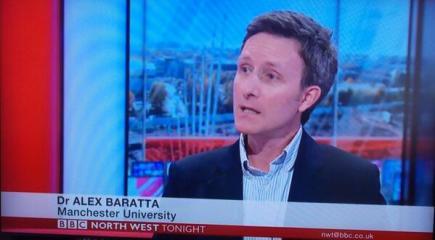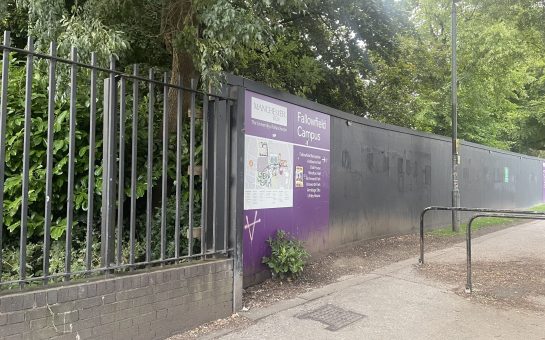Teachers in the North West are feeling pressured into restricting or hiding their regional accents in the classroom, according to new research from the University Of Manchester.
Dr Alex Baratta, a lecturer in linguistics, spoke to trainee teachers around the country in a study about how regional accents in the classroom may affect teachers at work.
Most of his respondents were from the North, and over a third confessed to feeling like a ‘sell-out’ for modifying their accents in favour of a more standardised way of speaking to avoid being perceived negatively by mentors or colleagues.
Speaking to MM, Dr Baratta said: “This was a continuation of a previous study into how accent modification in the workplace can affect how people perceive themselves.
“One of the participants [a trainee teacher] was told in an interview that if he didn’t change his accent, the interview would be stopped. Another was told that her accent would create the wrong impression. They were both from the North.
“Some of the teachers pointed out that we have all these regional accents and variations in Britain, so why do we have to create a standardised accent? And this is so important, particularly at primary level, where students need to be exposed to a wide variety of them.
“I do not underestimate how important it is for teachers to be understood by their students, especially if you are teaching phonics. But I feel, as did the participants, that there is a fine line.
“You can keep your regional accent, but how far in their mind do they need to dilute it? And when the comments they get can sometimes be negative it creates a stigma and, as one person said, that is hurtful when it is part of their life journey and who they are.
“There is a risk of them feeling like they don’t have an identity anymore because they are focussing more on how they speak rather than what comes out of their mouths.”
Dr Baratta added that another of his participants had been laughed at by a mentor for her Eccles accent, and some said they had been made to feel inferior if they didn’t neglect their ‘true voice’ to sound more appropriate for education.
He stressed the need for a balance between being clear without sacrificing the ‘unique richness that comes with regional accents’.
“Nobody is getting away from the absolute need for the teacher to be understood by his or her student. But to just say, you need to be understood…case closed, is a bit premature,” he said.
“We need to decide what the standard is for how teachers are supposed to speak, because regionally accented teacher trainees are going in not really knowing and being told to change.”

NO IDENTITY ANY MORE: Dr Baratta has highlighted the problem of ‘accentism’ within schools (©BBC, with thanks)
Lawrence, 24, is a trainee English teacher from Stockport, and classes himself as someone with a thick regional accent. He is not surprised by the outcome of Dr Baratta’s research, and said that the emphasis on speaking in a certain way can distract from teaching.
He said: “I can associate myself with it pretty strongly.
“I don’t think it would be as much of an issue if it was somebody with a southern accent; because it is almost like that is the area it emanates from and what they model the way they want us to speak on.
“There have been instances, particularly after receiving my feedback, where I have been making a conscious effort to speak in this proper way, and it can detract from what you are actually teaching the kids.
“You are almost concentrating as much on teaching yourself as you are the class, which can be tough. You could be getting all your grammar and spelling right, but they just don’t like the way in which you are putting it across.
“It can affect your own sense of identity within education when being a Northerner with a thick accent is deemed as incorrect or something that needs to be restrained.
“We live in a contemporary society, not the Victorian age. It is almost an antithesis of what we are being told to do in embracing other cultures when we have to restrict ourselves.
“And I think in some of the areas I have been based children are actually more likely to be receptive if you speak in an accent they can relate to, rather than talking in the so-called correct manner.”

TOO MANC TO HANDLE: Manchester icon Bez is one individual who would have to tone down his accent to teach (©ITV, with thanks)
Not everyone feels that regional accents are discouraged in schools, though. John Morgan, General Secretary of the Manchester Teachers’ Association, said he has never experienced any negative stigma around regional accents.
He told MM: “In training there is definitely an element of almost needing to be like an actor and assume a role, and the communication is really important, but I can honestly say that I have never heard of anybody who has been told that their accent is wrong.
“It has always been about what you say and how you say it as opposed to how it sounds coming out of your mouth.
“I think it is actually really good for kids to hear people with different accents because, even in a big city like Manchester with lots of different cultures, it can become very insular, and hearing another accent just makes it different for them and helps them realise the world is a bit bigger than where they live.
“In terms of case work, we have not come across this at all, and as long as their grammar is correct we would defend to the upmost people’s regional accents and their ability to speak like that in the classroom.”
Mr Morgan also said that unfamiliar accents would have no bearing on the quality of a child’s learning, nor would it infringe on a trainee’s ability to teach.
“Kids suss people out pretty quickly, and if they are decent people and they are good teachers, the kids will forget instantly that they are talking differently,” he added.
Some participants in the study felt strongly enough about the issue to suggest that British accents should be made a protected category, allowing them to celebrate teaching in their natural, Northern manner.
But despite teachers feeling frustrated about misrepresenting themselves in the classroom, Ofsted also said that in an inspection a teacher would never be penalised for having a strong regional accent.
A spokesperson for the organisation said: “Inspectors judge the quality of teaching at schools. Negative comments about the suitability of regional accents are clearly inappropriate, and form no part of our assessment of a school’s or teacher’s performance.”
More information on Dr Baratta’s work can be found at www.accentpride.co.uk
Image courtesy of Susana Fernandez, with thanks



